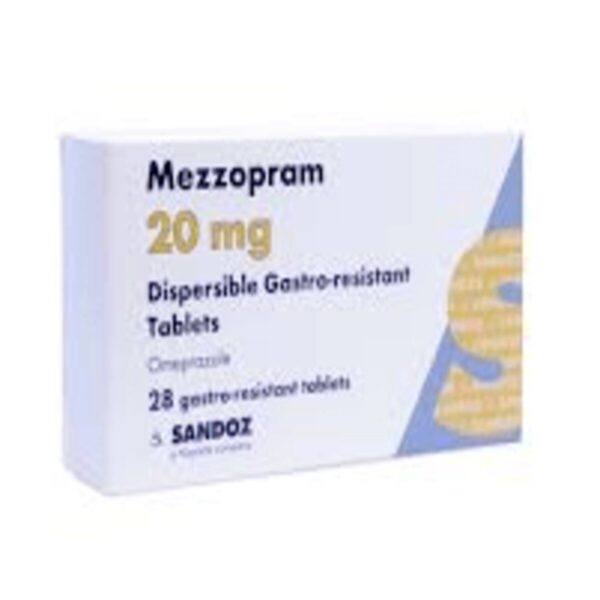- Description
- Brand
- How To Use
- Product Details
- Side Effects
- Ingredients
- How to Store
- Patient Information leaflet
- Questions & Answers (1)
Omeprazole Injection 40mg, 6ml x 5 Vials
If you are suffering from stomach ulcers or other acid-related issues, your doctor may have recommended omeprazole injection 40mg as a treatment option. This medication works by reducing the amount of acid that your stomach produces, providing you with much-needed relief.
Omeprazole injection can be used as an alternative to oral therapy, making it a convenient option for those who need fast relief. The active ingredient in this medication is omeprazole, which belongs to a group of medicines known as proton pump inhibitors. These medications are very effective at reducing stomach acid and providing relief from symptoms.
Omeprazole infusion is a safe and effective way to treat acid-related issues. If you are experiencing symptoms such as heartburn, indigestion, or pain in the stomach, this medication can provide you with the relief you need as an alternative to tablets.
Omeprazole Injection 40mg can be also used to treat cat, dogs and horses when prescribed by a vet.
Omeprazole Injection 40mg Reviews
After using Omeprazole Injection 40mg, it’s helpful to let others know about your experience. Reviews of an item help other users know that medicines received have helped the condition it is claimed for, how well the treatment worked or any issues to be aware of. We invite our users to leave a review of both their treatment and of the service provided. Click on the reviews tab to see if there has been feedback on this item.
What is the price of Omeprazole Injection 40mg?
The price of Omeprazole Injection 40mg is £24.59
Where can you buy Omeprazole Injection 40mg?
You can buy Omeprazole Injection 40mg at Dock Pharmacy Essex UK, UK Online Pharmacy.
Can you buy Omeprazole Injection 40mg Over the counter?
Omeprazole Injection 40mg is not available to buy over the counter. You need a prescription to buy Omeprazole Injection 40mg
Brand
Omeprazole
How To Use
How Omeprazole Injection is given to you
- Omeprazole can be given to adults including the elderly.
- There is limited experience with Omeprazole for intravenous use in children. Being given Omeprazole
- Omeprazole will be given to you by a doctor who will decide how much you need.
- The medicine will be given to you as an infusion into one of your veins.
Product Details
What you need to know before you are given Omeprazole Injection
You must not be given Omeprazole: • if you are allergic to omeprazole or any of the other ingredients of this medicine (listed in section 6). • if you are allergic to other proton pump inhibitor medicines (e.g. pantoprazole, lansoprazole, rabeprazole, esomeprazole). • if you are taking a medicine containing nelfinavir (used for HIV infection). Do not use Omeprazole if any of the above applies to you. If you are not sure, talk to your doctor, nurse or pharmacist before you are given this medicine. Warnings and precautions Omeprazole may hide the symptoms of other diseases. Therefore, if any of the following happen to you before you are given Omeprazole or after you are given it, talk to your doctor straight away: • You lose a lot of weight for no reason and have problems swallowing. • You get stomach pain or indigestion. • You begin to vomit food or blood. • You pass black stools (blood-stained faeces). • You experience severe or persistent diarrhoea, as omeprazole has been associated with a small increase in infectious diarrhoea. • You have severe liver problems. • If you have ever had a skin reaction after treatment with a medicine similar to Omeprazole that reduces stomach acid. • You are due to have a specific blood test (Chromogranin A). If you get a rash on your skin, especially in areas exposed to the sun, tell your doctor as soon as you can, as you may need to stop your treatment with Omeprazole. Remember to also mention any other ill-effects like pain in your joints. Taking a proton pump inhibitor like Omeprazole, especially over a period of more than one year, may slightly increase your risk of fracture in the hip, wrist or spine. Tell your doctor if you have osteoporosis or if you are taking corticosteroids (which can increase the risk of osteoporosis). Other medicines and Omeprazole Please tell your doctor, nurse or pharmacist if you are taking or have recently taken any other medicines, including medicines obtained without a prescription. This is because Omeprazole can affect the way some medicines work and some medicines can have an effect on Omeprazole. You must not be given Omeprazole if you are taking a medicine containing nelfinavir (used to treat HIV infection). Tell your doctor or pharmacist if you are taking any of the following medicines: • Ketoconazole, itraconazole, posaconazole or voriconazole (used to treat infections caused by a fungus). • Digoxin (used to treat heart problems) • Diazepam (used to treat anxiety, relax muscles or in epilepsy) • Phenytoin (used in epilepsy). If you are taking phenytoin, your doctor will need to monitor you when you start or stop taking Omeprazole. • Medicines that are used to thin your blood, such as warfarin or other vitamin K blockers. Your doctor may need to monitor you when you start or stop taking Omeprazole • Rifampicin (used to treat tuberculosis) • Atazanavir (used to treat HIV infection) • Tacrolimus (in cases of organ transplantation) • St John’s wort (Hypericum perforatum) (used to treat mild depression) • Cilostazol (used to treat intermittent claudication) • Saquinavir (used to treat HIV infection) • Clopidogrel (used to prevent blood clots (thrombi) • Erlotinib (used to treat cancer) • Methotrexate (a chemotherapy medicine used in high doses to treat cancer) – if you are taking a high dose of methotrexate, your doctor may temporarily stop your Omeprazole treatment. If your doctor has prescribed the antibiotics amoxicillin and clarithromycin as well as Omeprazole to treat ulcers caused by Helicobacter pylori infection, it is very important that you tell your doctor about any other medicines you are taking. Pregnancy and breast-feeding If you are pregnant or breast-feeding, think you may be pregnant or are planning to have a baby, ask your doctor or pharmacist for advice before taking this medicine. Omeprazole is excreted in breast milk but it is not likely to affect the child when therapeutic doses are used. Your doctor will decide whether you can take Omeprazole if you are breastfeeding. Driving and using machines Omeprazole is not likely to affect your ability to drive or use any tools or machines. Side effects such as dizziness and visual disturbances may occur (see section 4). If affected, you should not drive or operate machinery.
Side Effects
Possible side effects of omeprazole injection
Like all medicines, this medicine can cause side effects, although not everybody gets them. If you notice any of the following rare but serious side effects, stop using Omeprazole and contact a doctor immediately: • Sudden wheezing, swelling of your lips, tongue and throat or body, rash, fainting or difficulties in swallowing (severe allergic reaction). • Reddening of the skin with blisters or peeling. There may also be severe blisters and bleeding in the lips, eyes, mouth, nose and genitals. This could be ‘Stevens-Johnson syndrome’ or ‘toxic epidermal necrolysis’. • Yellow skin, dark urine and tiredness which can be symptoms of liver problems. Other side effects include: Common side effects (may affect up to 1 in 10 people) • Headache. • Effects on your stomach or gut: diarrhoea, stomach pain, constipation, wind (flatulence). • Feeling sick (nausea) or being sick (vomiting). • Benign polyps in the stomach. Uncommon side effects (may affect up to 1 in 100 people) • Swelling of the feet and ankles. • Disturbed sleep (insomnia). • Dizziness, tingling feelings such as “pins and needles”, feeling sleepy. • Spinning feeling (vertigo). • Changes in blood tests that check how the liver is working. • Skin rash, lumpy rash (hives) and itchy skin. • Generally feeling unwell and lacking energy. Rare side effects (may affect up to 1 in 1000 people) • Blood problems such as a reduced number of white cells or platelets. This can cause weakness, bruising or make infections more likely. • Allergic reactions, sometimes very severe, including swelling of the lips, tongue and throat, fever, wheezing. • Low levels of sodium in the blood. This may cause weakness, being sick (vomiting) and cramps. • Feeling agitated, confused or depressed. • Taste changes. • Eyesight problems such as blurred vision. • Suddenly feeling wheezy or short of breath (bronchospasm). • Dry mouth. • An inflammation of the inside of the mouth. • An infection called “thrush” which can affect the gut and is caused by a fungus. • Liver problems, including jaundice which can cause yellow skin, dark urine, and tiredness. • Hair loss (alopecia). • Skin rash on exposure to sunshine. • Joint pains (arthralgia) or muscle pains (myalgia). • Severe kidney problems (interstitial nephritis). • Increased sweating. Very rare side effects (may affect up to 1 in 10 000 people) • Changes in blood count including agranulocytosis (lack of white blood cells). • Aggression. • Seeing, feeling or hearing things that are not there (hallucinations). • Severe liver problems leading to liver failure and inflammation of the brain. • Sudden onset of a severe rash or blistering or peeling skin. This may be associated with a high fever and joint pains (Erythema multiforme, Stevens-Johnson syndrome, toxic epidermal necrolysis) • Muscle weakness. • Enlarged breasts in men. Side effects with unknown frequency (frequency cannot be estimated from the available data) • Inflammation in the gut (leading to diarrhoea). • If you are on Omeprazole for more than three months it is possible that the levels of magnesium in your blood may fall. Low levels of magnesium can be seen as fatigue, involuntary muscle contractions, disorientation, convulsions, dizziness or increased heart rate. If you get any of these symptoms, please tell your doctor promptly. Low levels of magnesium can also lead to a reduction in potassium or calcium levels in the blood. Your doctor may decide to perform regular blood tests to monitor your levels of magnesium. • Rash, possibly with pain in the joints Irreversible visual impairment has been reported in isolated cases of critically ill patients who have received omeprazole intravenous injection, especially at high doses, but no causal relationship has been established. Omeprazole may in very rare cases affect the white blood cells leading to immune deficiency. If you have an infection with symptoms such as fever with a severely reduced general condition or fever with symptoms of a local infection such as pain in the neck, throat or mouth or difficulties in urinating, you must consult your doctor as soon as possible so that a lack of white blood cells (agranulocytosis) can be ruled out by a blood test. It is important for you to give information about your medicine at this time. Do not be concerned by this list of possible side effects. You may not get any of them. Reporting of side effects If you get any side effects talk to your doctor, pharmacist or nurse. This includes any possible side effects not listed in this leaflet. You can also report side effects directly via the Yellow Card Scheme at www.mhra.gov.uk/yellowcard or search for MHRA Yellow card in the Google Play or Apple App Store. By reporting side effects you can help provide more information on the safety of this medicine.
Ingredients
What Omeprazole injection contains
– The active substance is omeprazole.
Each vial of powder for solution for infusion contains omeprazole sodium equivalent to 40 mg of omeprazole. –
The other ingredients are disodium edetate and sodium hydroxide.
How to Store
How to store Omeprazole Injection
Keep this medicine out of the sight and reach of children. Do not use this medicine after the expiry date which is stated on the vial and carton after EXP. The expiry date refers to the last day of that month. Keep the vial in the outer carton in order to protect from light. Shelf life after reconstitution: Solution for infusion reconstituted with sodium chloride 9 mg/ml (0.9%) should be used within 12 hours after preparation. Solution for infusion reconstituted with glucose 50 mg/ml (5%) should be used within 6 hours after preparation. From a microbiological point of view, the product should be used immediately unless it has been reconstituted under controlled and validated aseptic conditions. Do not throw away any medicines via wastewater or household waste. Ask your pharmacist how to throw away medicines you no longer use. These measures will help to protect the environment.
Patient Information leaflet
Click here for the Patient Information leaflet
Please read before using the product
Questions and answers of the customers
- There are no answers for this question yet.
You Might Also Like
£3.99 – £4.50
£3.99 – £4.50
- Availability: in stock
£11.36 – £20.10
Omeprazole Tab 10mg
Learn More£11.36 – £20.10
- Availability: in stock
Original price was: £179.20.£162.40Current price is: £162.40.
Original price was: £179.20.£162.40Current price is: £162.40.
- Availability: in stock
Original price was: £12.66.£10.45Current price is: £10.45.
Original price was: £12.66.£10.45Current price is: £10.45.
- Availability: in stock
Other Products From This Seller
Original price was: £68.00.£29.95Current price is: £29.95.
Calvin Klein CK Be Unisex Eau de Toilette Spray 200ml Fresh Floral Woody Musk Fragrance for All Experience the essence of individuality with Calvin Klein CK Be Unisex Eau de Toilette Spray 200ml, a fresh floral woody musk fragrance that celebrates uniqueness and self-expression. Launched in 1996, CK Be offers a clean and inviting scent […]
Learn MoreOriginal price was: £68.00.£29.95Current price is: £29.95.
- Availability: in stock
Original price was: £55.00.£24.95Current price is: £24.95.
Calvin Klein CK One Unisex Eau de Toilette Spray 100ml Fresh Citrus Fragrance for Men and Women Experience the iconic Calvin Klein CK One Unisex Eau de Toilette Spray 100ml, a fresh citrus fragrance that embodies individuality and unity. Launched in 1994, CK One has become a timeless classic, offering a clean and contemporary scent […]
Learn MoreOriginal price was: £55.00.£24.95Current price is: £24.95.
- Availability: in stock
Original price was: £30.00.£15.95Current price is: £15.95.
Quorum Edt 100ml Spray Classic Woody Aromatic Men’s Fragrance Experience timeless sophistication with Quorum Eau de Toilette 100ml Spray, a classic woody aromatic fragrance that embodies masculinity and elegance. Launched in 1981, this scent has stood the test of time, offering a distinctive aroma that leaves a lasting impression. Ideal for both daily wear and […]
Learn MoreOriginal price was: £30.00.£15.95Current price is: £15.95.
- Availability: in stock
Original price was: £24.99.£9.99Current price is: £9.99.
Police To Be King Eau de Toilette Spray 40ml Spicy Woody Men’s Fragrance Experience the essence of royalty with Police To Be King Eau de Toilette Spray 40ml, a spicy woody fragrance that embodies power and confidence. Launched in 2013, this scent offers a distinctive aroma that leaves a lasting impression. Ideal for the modern […]
Learn MoreOriginal price was: £24.99.£9.99Current price is: £9.99.
- Availability: in stock
Original price was: £60.00.£24.95Current price is: £24.95.
Ralph Lauren Polo Sport Fresh Eau De Toilette 125ml Fresh Citrus and Woody Men’s Fragrance Experience the invigorating energy of Ralph Lauren Polo Sport Fresh Eau de Toilette 125ml, a fresh citrus and woody fragrance that embodies the spirit of an active lifestyle. This scent offers a distinctive aroma that leaves a lasting impression. Ideal […]
Learn MoreOriginal price was: £60.00.£24.95Current price is: £24.95.
- Availability: in stock
Original price was: £45.00.£24.95Current price is: £24.95.
Paul Smith Men Eau de Toilette Spray 100ml Classic Woody Floral Musk Men’s Fragrance Experience timeless elegance with Paul Smith Men Eau de Toilette Spray 100ml, a classic woody floral musk fragrance that embodies sophistication and masculinity. Launched in 2000, this scent has stood the test of time, offering a distinctive aroma that leaves a […]
Learn MoreOriginal price was: £45.00.£24.95Current price is: £24.95.
- Availability: in stock
Original price was: £44.00.£24.95Current price is: £24.95.
Moschino Uomo Eau De Toilette Spray 125ml Classic Woody Oriental Men’s Fragrance Experience timeless elegance with Moschino Uomo Eau de Toilette Spray 125ml, a classic woody oriental fragrance that embodies sophistication and masculinity. Launched in 1997, this scent has stood the test of time, offering a distinctive aroma that leaves a lasting impression. Whether for […]
Learn MoreOriginal price was: £44.00.£24.95Current price is: £24.95.
- Availability: in stock
Original price was: £37.00.£19.95Current price is: £19.95.
MontBlanc Legend Red Eau de Parfum 30ml Bold and Charismatic Men’s Fragrance Experience the allure of Montblanc Legend Red Eau de Parfum 30ml, a bold and charismatic men’s fragrance that embodies modern masculinity. This scent is designed for the discerning man who exudes confidence and style. Whether for evening wear or special occasions, Montblanc Legend […]
Learn MoreOriginal price was: £37.00.£19.95Current price is: £19.95.
- Availability: in stock
Original price was: £52.00.£19.95Current price is: £19.95.
Ted Lapidus Lapidus Pour Homme Eau de Toilette Spray 100ml Classic Woody Aromatic Men’s Fragrance Experience timeless elegance with Ted Lapidus Lapidus Pour Homme Eau de Toilette Spray 100ml, a classic woody aromatic fragrance that embodies sophistication and masculinity. Launched in 1987, this scent has stood the test of time, offering a distinctive aroma that […]
Learn MoreOriginal price was: £52.00.£19.95Current price is: £19.95.
- Availability: in stock
Original price was: £90.00.£29.95Current price is: £29.95.
Joop Homme Eau de Toilette Spray, 200ml Bold and Oriental Men’s Fragrance Exude confidence with Joop Homme Eau de Toilette Spray, 200ml, a bold and sensual fragrance that celebrates masculinity and individuality. Known for its rich and oriental aroma, this iconic scent has captivated men worldwide. Perfect for evening wear and special occasions, Joop Homme […]
Learn MoreOriginal price was: £90.00.£29.95Current price is: £29.95.
- Availability: in stock




















